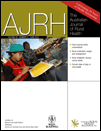
Australian Journal of Rural Health
Scope & Guideline
Exploring innovative solutions for rural health challenges.
Introduction
Aims and Scopes
- Rural Health Service Delivery:
Research that examines the effectiveness, accessibility, and quality of health services in rural and remote areas, including innovative models of care and the impact of geographical factors on health outcomes. - Indigenous Health:
Exploration of health care practices, challenges, and outcomes specifically affecting Indigenous populations living in rural areas, emphasizing culturally appropriate practices and community engagement. - Mental Health and Well-being:
Studies focusing on mental health issues prevalent in rural settings, including the impact of socio-economic factors, access to care, and strategies for improving mental health services. - Workforce Development and Education:
Research aimed at understanding and enhancing the rural health workforce, including training, retention, and the influence of educational placements on career choices. - Chronic Disease Management:
Investigations into the prevalence and management of chronic diseases in rural populations, including access to preventive care and treatment options. - Community Engagement and Co-design:
Research that emphasizes the importance of community involvement in health service design and delivery, particularly through participatory approaches that engage local populations.
Trending and Emerging
- Telehealth and Digital Health Solutions:
The increasing focus on telehealth reflects the need for accessible health care delivery in remote areas, especially post-COVID-19, showcasing innovative approaches to reach underserved populations. - Climate Change and Health Impacts:
Emerging studies are beginning to address the relationship between climate change and health outcomes in rural areas, highlighting the need for adaptive strategies to mitigate health risks. - Youth Mental Health Initiatives:
There is a growing emphasis on mental health initiatives aimed at youth in rural communities, recognizing the unique challenges faced by younger populations in these settings. - Culturally Safe Practices:
Research increasingly focuses on culturally safe health practices, particularly concerning Indigenous health, as a means to improve service delivery and health outcomes. - Community-Based Interventions:
The trend towards community-based health interventions is rising, emphasizing the role of local engagement and co-design in addressing health challenges. - Chronic Disease Prevention:
A notable increase in studies focusing on preventive measures for chronic diseases, including lifestyle interventions tailored to rural populations, reflects a proactive approach to health care.
Declining or Waning
- Acute Care Settings:
There has been a noticeable decrease in research specifically addressing acute care scenarios in rural contexts, which may indicate a shift towards preventive care and chronic disease management. - Traditional Health Models:
Research focusing on traditional models of health care delivery is waning, as the journal increasingly emphasizes innovative, community-driven approaches. - Epidemiological Studies:
There seems to be a reduction in the publication of epidemiological studies that do not incorporate qualitative insights or community perspectives, reflecting a trend towards more integrated research methodologies. - Health Technology Utilization:
Studies specifically focused on the utilization of traditional health technologies in rural settings are less frequently published, possibly due to the rise of telehealth and digital health solutions.
Similar Journals
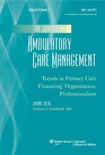
JOURNAL OF AMBULATORY CARE MANAGEMENT
Connecting research and practice for impactful health policy reform.JOURNAL OF AMBULATORY CARE MANAGEMENT, published by Lippincott Williams & Wilkins, is a leading peer-reviewed journal dedicated to advancing research and practice in the field of health policy, with a specific focus on ambulatory care management. Since its inception in 1978, this journal has served as a critical platform for disseminating innovative studies, insights, and methodologies that inform policy makers, healthcare professionals, and academic researchers alike. By maintaining an impressive ranking within the Q3 category in Health Policy and a Scopus rank of 148 out of 310, it underscores the journal's growing influence in shaping health policy discussions and decisions. The journal operates on a traditional subscription model, ensuring a high-quality review process while remaining accessible to those wishing to subscribe. With an ongoing commitment to excellence, the JOURNAL OF AMBULATORY CARE MANAGEMENT is essential for anyone involved in improving outcomes in ambulatory care settings and influencing health policy reforms, making it a must-read for researchers, practitioners, and students aiming to stay at the forefront of healthcare innovation.
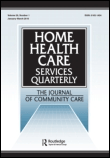
HOME HEALTH CARE SERVICES QUARTERLY
Shaping the Future of Home Health Care PracticesHOME HEALTH CARE SERVICES QUARTERLY, an esteemed publication by Taylor & Francis Ltd, has been a cornerstone of scholarly discourse in the fields of community and home care since its inception in 1979. With ISSN 0162-1424 and E-ISSN 1545-0856, this quarterly journal promotes rigorous research and innovative practices in home health care services, significantly impacting health policy and public health discussions. The journal enjoys a respectable Impact Factor, reflecting its contributions to the field, and currently ranks Q2 in Community and Home Care, along with Q3 status in both Health Policy and Public Health. Researchers, professionals, and students alike can benefit from the diverse range of articles that address practical challenges and emerging trends within the home health care industry. Although not an open-access journal, it continues to provide a vital platform for advancing knowledge and disseminating best practices essential for improving health outcomes. As it embarks on its journey towards 2024, it remains committed to fostering an inclusive dialogue that shapes the future of home health care.

Canadian Journal of Rural Medicine
Exploring the unique challenges of rural medicine in Canada.The Canadian Journal of Rural Medicine, published by Wolters Kluwer Medknow Publications, serves as a vital platform for advancing knowledge and research in the field of rural medicine. This journal, ISSN: 1203-7796 and E-ISSN: 1488-237X, focuses on the unique healthcare challenges and opportunities found in rural settings in Canada and beyond. As of 2023, it holds a commendable position in the Q3 quartile in the medicine (miscellaneous) category, ranking #270 out of 636 in the general medicine field according to Scopus, which places it in the 57th percentile—indicative of its growing influence and relevance. The journal not only emphasizes the importance of rural healthcare but also aims to disseminate quality research and best practices to improve health outcomes in isolated communities. Although available through subscription, the journal remains accessible to a wide audience, ensuring that both practitioners and researchers can engage with contemporary issues in rural health. With a commitment to bridging the gap in medical knowledge and practice, the Canadian Journal of Rural Medicine is essential for anyone dedicated to improving healthcare in less populated areas.
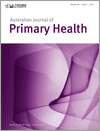
Australian Journal of Primary Health
Shaping the Future of Health Policy and PracticeWelcome to the Australian Journal of Primary Health, a vital resource for researchers and practitioners in the evolving fields of health policy and public health. Published by CSIRO PUBLISHING, this journal has established itself as a significant platform for sharing groundbreaking research and insights since its inception in 2001. With an ISSN of 1448-7527 and an E-ISSN of 1836-7399, it provides scholarly articles addressing crucial topics in health policy and public health, and is recognized in 2023 as a Q3 journal in both domains. While it currently does not offer open access, the journal is committed to disseminating high-quality, peer-reviewed research that informs health practices and policies across Australia and beyond. By contributing to the conference of academic knowledge, the Australian Journal of Primary Health plays an essential role in enhancing the understanding of health systems and influencing health outcomes, making it indispensable for students, researchers, and health professionals alike.
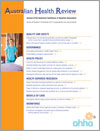
Australian Health Review
Driving Change in Health Care Through Scholarly DiscourseAustralian Health Review is a prestigious peer-reviewed journal published by CSIRO PUBLISHING, focusing on the dynamic field of health policy. Established in 1980, this journal has continuously evolved to address contemporary health challenges in Australia and beyond, showcasing research that informs policy decisions and enhances health care delivery. With an impressive Q2 ranking in the sector of Health Policy and a Scopus rank of #162 out of 310, it holds a significant position in the academic community, offering vital insights to researchers, practitioners, and educators alike. Although not an open-access journal, it provides valuable research contributions that advance the discourse in health policy and practice. Located at UNIPARK, BUILDING 1, LEVEL 1, 195 WELLINGTON RD, LOCKED BAG 10, CLAYTON, VIC 3168, AUSTRALIA, the journal's comprehensive scope spans from 1980 to 2024, reflecting on the evolving landscape of health research. By disseminating high-quality studies, the Australian Health Review continues to play an essential role in shaping health policy and improving health outcomes.

Journal of Rural and Community Development
Fostering Collaboration for Vibrant Communities.Welcome to the Journal of Rural and Community Development, a distinguished open-access publication from Brandon University, Rural Development Department, dedicated to advancing the understanding of rural and community issues. With an ISSN of 1712-8277, this journal has been at the forefront of disseminating innovative research and practical insights since 2005. Conveniently accessible to a global audience, the journal aims to bridge academic research with real-world applications, addressing challenges and opportunities in rural and community contexts. Researchers, professionals, and students alike will find valuable resources that inspire critical thinking and foster collaboration within the field of rural development. Based in Brandon, Manitoba, Canada, the journal upholds a commitment to scholarly excellence and community engagement, making it an essential platform for anyone invested in the progress and well-being of rural populations.
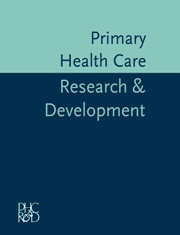
Primary Health Care Research and Development
Empowering practitioners with accessible, impactful findings.Primary Health Care Research and Development is an esteemed peer-reviewed journal published by Cambridge University Press, dedicated to advancing the field of primary health care. With a focus on innovative research and development, this journal covers a wide range of topics including care planning and public health, as illustrated by its current Q2 quartile rankings in Care Planning and Public Health, Environmental and Occupational Health for 2023. The journal, which has embraced Open Access publication since 2019, strives to ensure that critical research findings are accessible to a global audience, facilitating knowledge exchange among researchers, practitioners, and policymakers. Operating from its base in the United Kingdom, Primary Health Care Research and Development not only serves as a platform for rigorous scholarly articles but also aims to influence practice and improve health care delivery worldwide, making it an essential resource for those invested in the future of primary health care.
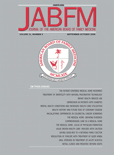
Journal of the American Board of Family Medicine
Empowering Family Medicine through Quality Research.The Journal of the American Board of Family Medicine, with ISSN 1557-2625 and E-ISSN 1558-7118, is a prestigious publication dedicated to advancing the field of family medicine. Published by the American Board of Family Medicine, this journal has established itself as a vital resource for researchers, practitioners, and students interested in both family practice and public health. As of 2023, it boasts impressive rankings, being in the Q1 category of Family Practice and the Q2 category of Public Health, Environmental and Occupational Health according to Scopus metrics, reflecting its significant impact and influence in the academic community. The journal's focus on high-quality research ensures that it remains at the forefront of evidence-based practice, fostering the dissemination of knowledge that is critical for improving patient care and outcomes. This journal, although not open-access, provides a wealth of insights and findings relevant to professionals striving to enhance their understanding and implementation of best practices in family medicine. With a converged publication history starting in 2002, it continues to serve as an essential platform for innovative studies and discussions that shape the future of family medicine.

Asian American Journal of Psychology
Empowering voices in the field of psychology.The Asian American Journal of Psychology is a premier academic publication dedicated to advancing the field of psychology by focusing on the experiences, mental health needs, and unique cultural contexts of Asian American populations. Published by the Educational Publishing Foundation of the American Psychological Association, this journal has established itself as a critical platform since its inception in 2010, promoting high-quality empirical research and scholarship. With an impact factor placing it in the second quartile (Q2) for 2023 in the miscellaneous psychology category, it ranks #98 out of 216 in general psychology according to Scopus, reflecting its significant contribution to the discipline. Although it does not operate under open access, the journal's robust editorial standards ensure that the research published is both credible and relevant. Aimed at researchers, professionals, and students alike, the Asian American Journal of Psychology seeks to foster a deeper understanding of psychological issues affecting the Asian American community and serves as an essential resource for those committed to diversity and inclusion in psychological research.
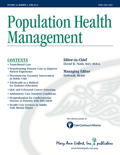
Population Health Management
Empowering researchers to shape the future of healthcare delivery.Population Health Management, published by Mary Ann Liebert, Inc., is a leading peer-reviewed journal that focuses on the intersection of health policy, management, and public health. With an impact factor reflecting its relevance in diverse healthcare discussions, this journal provides a crucial platform for researchers and professionals to share innovative methodologies and insights surrounding population health strategies. It is indexed in Scopus, boasting impressive rankings such as Q2 in Health Policy and Q1 in Leadership and Management for 2023. Covering converged years from 2008 to 2024, the journal aims to advance the field by publishing studies that address the complexities of healthcare delivery, public health initiatives, and management practices. Accessible through open access options, Population Health Management endeavors to engage a wide audience, from researchers to policymakers, aiming to improve health outcomes at the population level in the United States and beyond.